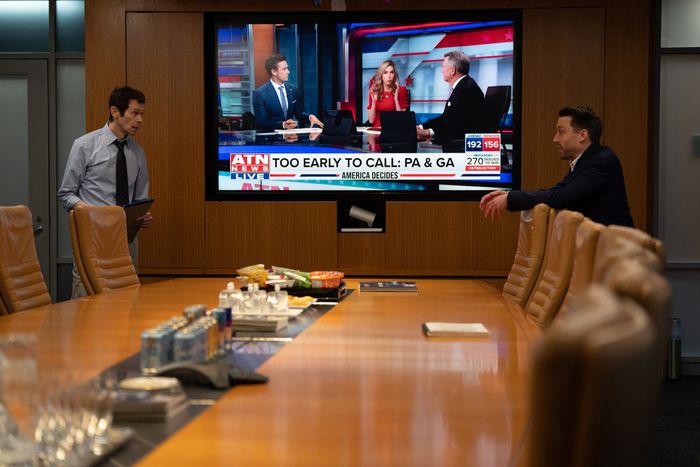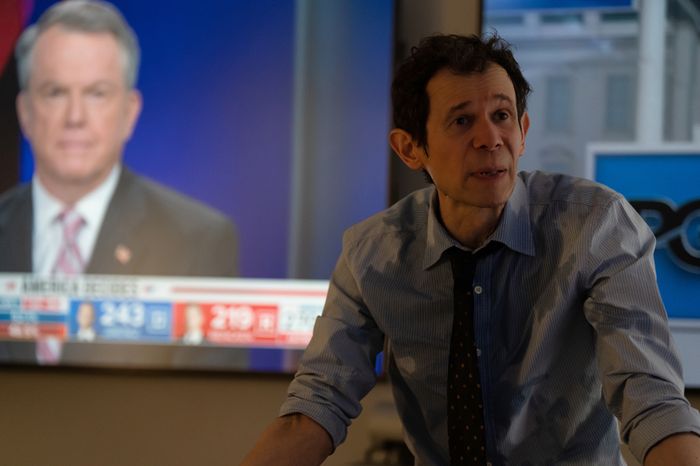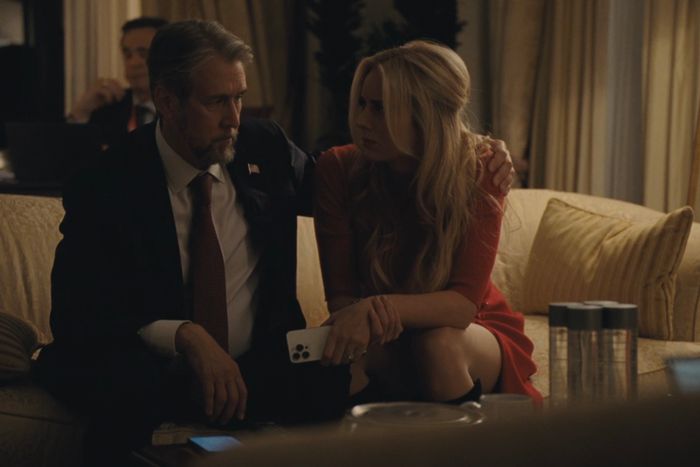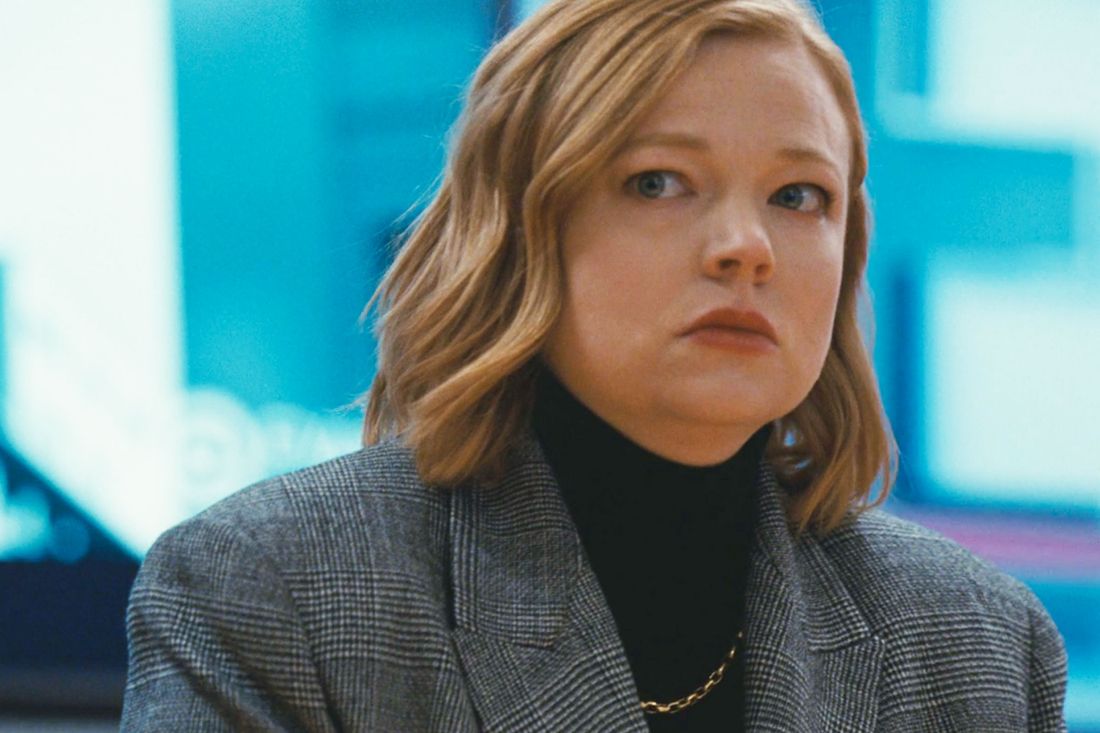
Succession’s “America Decides” depicts several dramatic fractures. The biggest one, democracy, falls apart the second Roman convinces Kendall that it’s acceptable to call an election even when you don’t know which presidential candidate won the Electoral College. But the episode spends more time and attention on the many fissures and chasms within the Roy family — beginning with Shiv’s distaste for Republican candidate Jeryd Mencken and continuing to the moment Kendall discovers she partnered with GoJo CEO Lukas Matsson to oust her brothers from Waystar. Several stories crystallize in this conference room: Mencken likely ascends to the presidency, these two Roy brothers fully embrace corporate power over democratic ideals, and, in one brief close-up, Shiv appears to signal a definite shift away from her family.
Despite the relatively enclosed setting of “America Decides,” director Andrij Parekh describes enormous production challenges and the importance of finding balance between Succession’s humor and elements of tragedy. Parekh also acknowledges deliberate parallels with the recent past; the feeling he was hoping to capture, he says, was Adam McKay’s 2016 Election Night party, which he’d attended with Jesse Armstrong and several members of the Succession cast. “Adam would be getting these text messages about what was about to be announced 20 minutes before it came on the news,” he says. “Then, of course, that party went from boisterous and fun to very quiet.”
This episode was a big one!
Big, big, scary episode.
When you say “scary,” do you mean scary for you? For the audience? For the characters?
I mean everything. When you get the script, you read it and realize how much work goes into it — preparing all of the video elements, the world-building. Just realizing, Oh my God, we’ve got to shoot all this stuff: a whole PGN Election Night coverage, an entire ATN Election Night coverage. Playing it back so the actors can react onscreen to it. It was a massive undertaking and pushed the boundaries of what I’m used to with Succession.
How did you tackle it all?
There was a whole breakdown. Script-wise, we had to cast all of the news anchors and shoot all the material about two weeks in advance, so there would be enough time for our in-house video prep to prepare all the chyrons to make it look like real election coverage. Then it was going through and choosing takes. It was an undertaking.
It sounds like filming two separate episodes.
It’s two in one. And I hope no one notices the work that went into it! That’s what makes it feel real.
The ATN office building — is that the CNBC building?
CNBC New Jersey, yes. Our access was basically weeknights after 6 p.m., the weekends, then before 6 a.m. Monday morning. It was some pretty serious night stuff, and what’s great was we were shooting election coverage happening at night. So we had that energy of probably too much coffee, then too too much coffee.
How did you approach the overall tone of the episode? It seems to have sparked some unpleasant flashbacks.
We shot the pilot for Succession in 2016 around election time. I think our second, third day of photography was the day after the election. We went to an Election Night party at Adam McKay’s apartment, and Jesse Armstrong and some of the actors were there. Adam would be getting these text messages about what was about to be announced 20 minutes before it came on the news. You had a sense. Then, of course, that party went from boisterous and fun to very quiet and people leaving without saying good-bye.
That was the feeling I was hoping to capture in this. What I noticed more and more in American-television election coverage, because of our two-party system, is that it gets broadcast like a sporting event. For many, it probably is sports: the way it looks, the way it feels, that it’s two teams and there’s a scoreboard and numbers. We’re running possibilities, blah blah blah. So it was creating this world at ATN where that feeling exists.
We had a couple of election advisers who worked on various networks telling us how things play out on Election Night. Everything from which states report when to what would happen if something in Milwaukee actually burned down. And there’s the briefing at the top of the episode where Darwin says that no one can tell the viewers what’s going to happen or we’ll lose our credibility. Then, immediately, Tom calls Kendall.
Yeah, and Greg has to spend a lot of time trying to tell the Roy siblings they’re not allowed on the newsroom floor. By the end, Tom is walking up to that boardroom and telling the Roys that the election is their call.
Very cringey. Hopefully, it feels very real.
I wanted to ask about wasabi choreography. The scene where Greg gets wasabi in Darwin’s eyes is such a stupid, small moment. Then it quickly balloons into this huge clownish thing that potentially tips them into calling an election. How did you approach filming it?
That’s what Succession can do so well: walk the tightrope of tragedy and comedy. It can’t fall too much into one side or it becomes a broad comedy, a soap opera, or just a tragedy. What makes it infinitely watchable is the combination.
In terms of blocking that scene, it needs to feel completely plausible that it happened, then it’s just allowing it to get worse. And you have Roman there watching, Shiv has arrived, and it’s about making it into something that happened, not something laugh-y and jokey. It’s a tough scene, and you do think, Oh man, how am I going to pull this off and make it feel real?
Were you futzing around with different takeout boxes? That sort of thing?
We’d gone through all of that in preproduction and talked about what we thought was going to be the right size and placement on the table. We’d planted the drinks there already — that’s all there at the beginning of the night. And, originally in the script, it was Sprite that got poured in his eyes. But LaCroix just seems funnier for some reason.
With LaCroix, Greg can yell that it’s not that lemony.
Oh yeah, it was a lot of fun. But then you’re shooting, and you’re like, Oh man, did that go too far?
How do you know? Are there things that signal to you where the line is?
The key for that kind of scene is to really be in on people’s reactions. Instead of actions, reactions are pushed to the forefront. It’s not shot wide.
I often find that if I’m laughing at the monitor, maybe it has gone too far.
There are all these very upsetting moments in the ATN offices, and meanwhile, Connor’s in a hotel room saying, “Alas Kentucky, alas vanity.”
It’s bringing a little accountability to him, and it seems quite foolish. Who knows how seriously he’s taking this thing. Did he really see himself as president? He seems quite happy to be in the diplomatic corps and go wherever to serve the U.S. government.
He makes me laugh every time. I think his character is so great, but he has this amazing soul, and he feels very down-to-earth on some level, even though he’s happy to say that he’s a billionaire in his concession speech.
It does feel like Connor is direct and honest about what he wants and means. Whereas for someone like Shiv, this episode is a bit of comeuppance. She’s attempting to communicate to her brothers that she does actually care about democracy and is worried about this outcome. At least I think she does? But they either can’t or don’t want to read it as a serious concern, because all three of them are constantly undermining or reversing their own positions.
What’s interesting in that threesome is Shiv has been, since the first episode, this Democratic political adviser. It’s where she puts her sense of self, I think. Whether she actually believes in it, I’m not 100 percent sure. Kendall, tragically, feels like he can compartmentalize what’s good for the country versus what’s good for business. I think Roman is probably the most clear-eyed in this episode in going after what’s good for business, carrying on his father’s legacy, and remaking ATN with Mencken.
I think what the show has done is exposed the quid pro quo of politics and media. The politicians need the media to support them, but the media needs politicians to get people excited and to make it watchable.
How did you talk through the scene where Kendall finally figures out that Shiv has been playing him against Matsson? How did you figure out the blocking?
For me, it was important that Shiv doesn’t know what Kendall knows when he’s finding out. It could’ve been blocked so that Greg was in the room with them, so that Shiv would overhear it when Kendall goes to talk to Greg. But it was really important that, at that moment, Shiv does not know what Kendall knows. Shiv does not know what Greg has told him about her.
Because she doesn’t know, she’s frozen in place. Then she goes and spills the beans, assumes what he knows and what he doesn’t, and she’s done herself in. It was about making her feel trapped, being guilty and not able to hide it. Suddenly, she’s standing there trying to act like she didn’t steal the cookies, but in fact, the cookies are in her hands. What do you do in that moment? I think it’s always great to have conversations that characters are watching but don’t hear.
So much of the series is about how information does and does not move between characters, but it’s also about how even the information they do learn can be read in multiple ways. It’s always ambiguous or in this conditional space. You’re caught in uncertainty all the time.
That’s what makes it super-interesting for me. I’ll read the scripts, and we’ll block it, and suddenly you’re like, Oh wow. This is not what I thought it was going to be. Everyone has a point of view, and everyone has a different understanding of what’s happening.
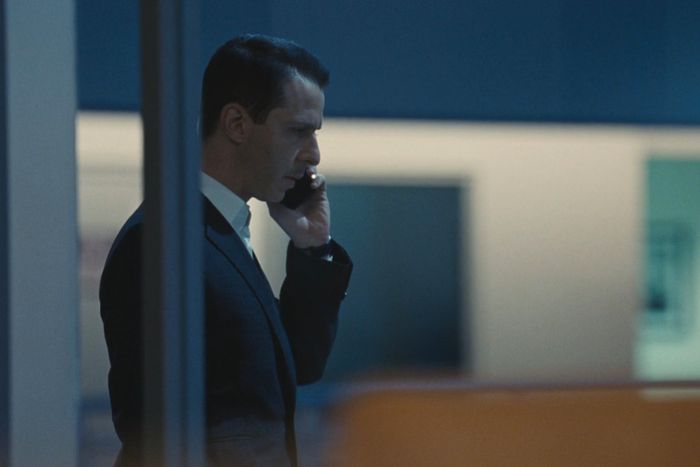
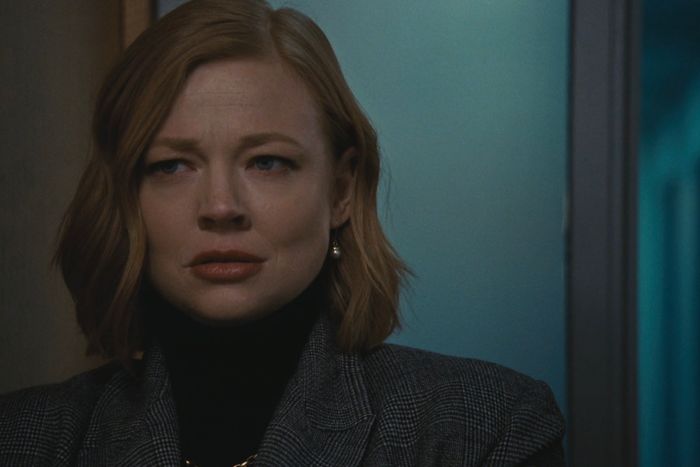
It reminds me of the close-up on Shiv’s face in the boardroom after the election is called and Roman insists it’s not a big deal because nothing is really going to happen. Shiv says, “Things do happen, Rome,” and that close-up feels different from the show’s typical visual language.
I wanted Shiv to feel very isolated in that moment. That, to me, was more about her communicating with the audience than with Roman. That’s why we isolated and filmed her in the back of the room having come in — away from where the main action is.
It’s rare for the show to communicate with the audience that directly. Was it in the script? Or was that something you figured out in rehearsal?
A lot of the show is shot, at least in this episode, on over-the-shoulder cameras. I wanted that moment to feel just a little bit different.
I kept looking at it and wondering if it was a real shift for Shiv, or if she’ll pull back on it. Is it a moment of clarity for her?
I wouldn’t say “moment of clarity.” I think it’s more that she’s pointing out what her brothers have done. They’ve taken a toy and broken it, and it feels like they’re just going to go off and be fine. There are no consequences for them. Maybe it’ll be inconvenient for Kendall’s family to suddenly have a bodyguard all the time. But Roman is fine. Roman doesn’t think twice about it.
But for Shiv, it’s suddenly this new awareness.
I think so.
I’m very curious about what happens in the finale. I had a dream that it does a time jump into the future and Shiv’s standing in a postapocalyptic landscape surveying the damage they’ve all done.
Or they all go to a Buddhist retreat, and they’ve given everything away. [Laughs.]
This interview has been edited and condensed.
More From This Series
- Is Kathleen Kennedy’s Star Wars Empire Ending?
- Maybe Ben Affleck Should Just Read Fan Fiction
- Enjoy J. Smith-Cameron’s Martini-Themed Crossword Puzzle ‘With a Twist’



